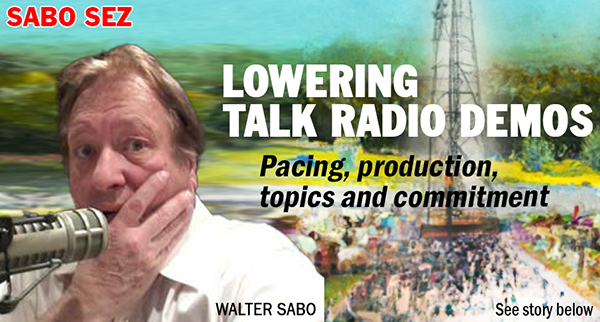Attracting Younger Demos
By Walter Sabo
Consultant, Sabo Media
A.K.A. Walter Sterling
Radio Host, Sterling on Sunday
Reaching younger listeners requires a combination of topics, pacing, and production values. As a consultant, when launching talk stations the client had an opportunity to identify the target demo. Based on their target, the station was built to own that demo. To attract a specific target, they followed these steps:
— Identify the target listener: sex, age, preferences and which stations are they currently listening to?
— Commit to attract the specific listener 24/7. A music station can’t win if it plays Taylor Swift in the morning and Pavarotti at night. Consistency of all format elements delivers a consistent audience profile.
— Topics. From experience, younger listeners have no time for theoretical discussions of politics or the contents of the op-ed page. Any op-ed page. Topics must be based on urgent, current eye-level aspects of a younger person’s life in order to attract them to a radio show. On “Sterling On Sunday” I mentioned that my 14-year-old daughter was going into the slime business. That was followed by 10 lines lit of 30-year-old fathers who were coaching their 14-year-olds on managing a – slime business!
Respect that whatever topic the target listener cares about is an important, serious topic.
— Production. The competition for younger listeners are music stations. The production on your station should be as good or better than any music station. That means, no stale promos, they have to be freshened every day, or every hour.
— Pace. Match the pace of the life of your target listener. If you want to reach a 30-year-old (and you can), remember that they have to drop off the kids at school, get milk, take the back way to get to work on time and make that call to the dentist – all between a given moment and your next weather report. Kudos to Bill Wills morning host on WTAM, Cleveland who delivers a fast-fast-paced show – worth a listen.
When taking phone calls, screen them for age. Let the caller say one thing and then bye. The more calls you take the more calls you’ll get. The shorter the calls, the younger the callers will be. And PLEASE do not thank callers for “holding on.”
Walter Sabo was the youngest Executive Vice President in the history of NBC. The youngest VP in the history of ABC. He was a consultant to RKO General longer than Bill Drake. Walter was the in house consultant to Sirius for eight years. He has never written a resume. Contact him at walter@sabomedia.com. or mobile 646-678-1110. Hear Walter Sterling at www.waltersterlingshow.com. Meet Walter Sabo at TALKERS 2023 on Friday, June 2.




 The decision to change WABC from music to talk back in 1982 was not made by corporate, it was made by its then-program director, Jay Clark. Corporate was hoping he would approve the change, “they” lobbied for it, but the call was the ultimate responsibility of the program director. The business plan for WABC as a talk station predicted it to be profitable in year 10. (That’s because KABC, Los Angeles took 10 years to turn a profit.) As it turned out, WABC turned a profit in year 11.
The decision to change WABC from music to talk back in 1982 was not made by corporate, it was made by its then-program director, Jay Clark. Corporate was hoping he would approve the change, “they” lobbied for it, but the call was the ultimate responsibility of the program director. The business plan for WABC as a talk station predicted it to be profitable in year 10. (That’s because KABC, Los Angeles took 10 years to turn a profit.) As it turned out, WABC turned a profit in year 11.